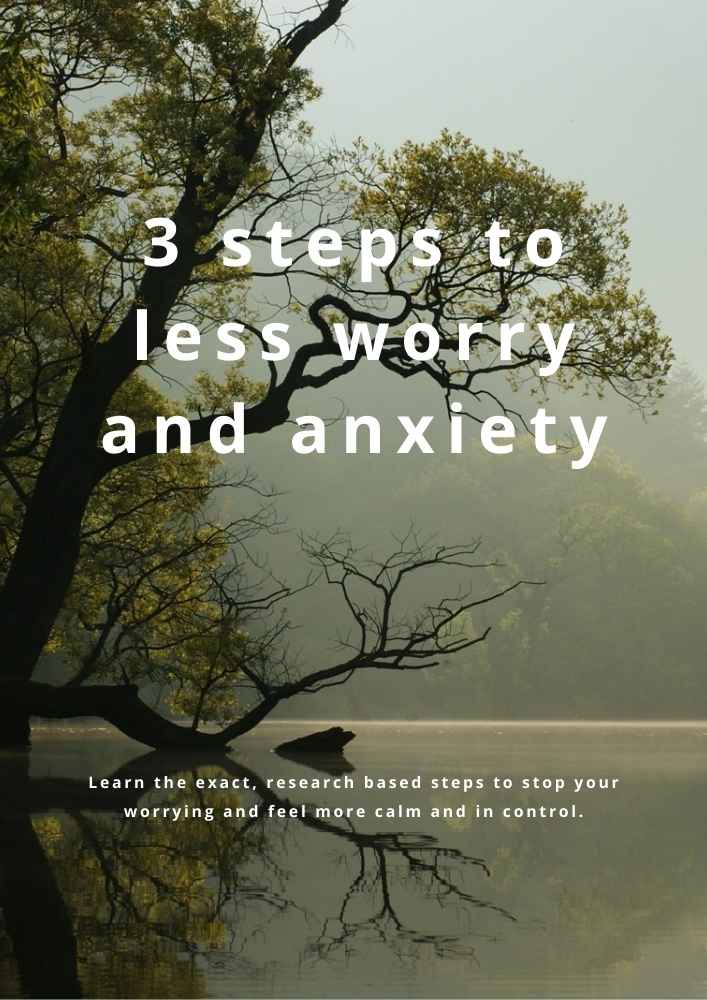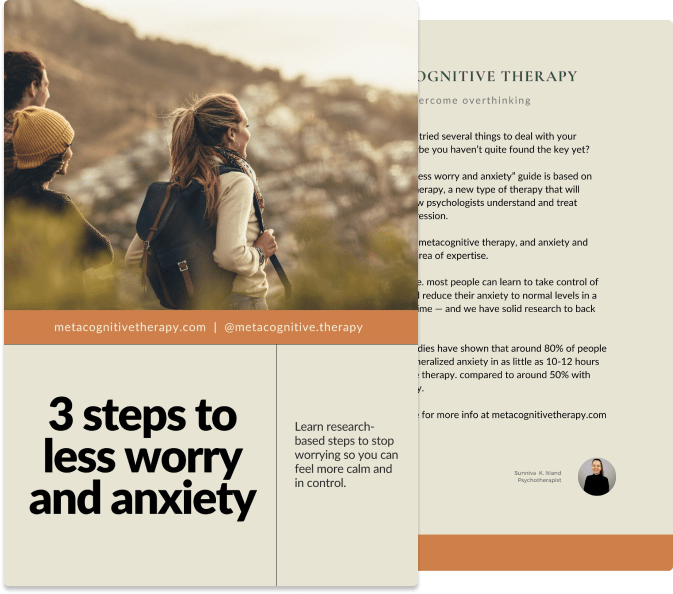The real cause behind depression (and what to do about it)

Download our best tips on reducing anxiety and worrying
Learn three powerful metacognitive therapy steps to stop the worry cycle, reduce anxiety, and feel calmer in everyday life.
.jpeg)
.jpeg)
Why do some people get depressed and others don't? While some experience a lot of pain in their life without it seeming to significantly affect them, others are depressed despite an outwardly good life.
New research on Metacognitive Therapy (MCT) has shown that depression has less to do with our circumstances, and more with our beliefs about our thoughts and emotions.
Why do we get depressed?
- Is depression a disease or an imbalance in the brain?¹
- Does depression strike at random?
- Are some people just born happier?
- Do we get depressed because we have too many negative thoughts?
- Or is depression a consequence of unprocessed loss and trauma?
While all of these factors may negatively impact our mental state, according to the latest research, depression is actually a consequence of our metacognitive beliefs and the counterproductive strategies we use to deal with feelings and thoughts.
The good news? We can improve and even get rid of depression if we manage to change our unhelpful strategies and beliefs so we can ruminate less and avoid letting negative thoughts feelings dictate your day.
Negative thoughts aren't the problem
Although many commonly used strategies try to stop or change our negative thoughts, the truth is negative thoughts and feelings are a completely normal part of life. Everyone experiences negative thoughts, even people who live happy lives. In fact, people who are depressed don't necessarily have more negative thoughts or problems than people who aren't depressed.
So negative thoughts aren't actually the problem, and it's not necessary to get rid of negative thoughts in order to live a good life.
So what's the problem? Rumination.
If you ruminate a lot, you're likely to feel depressed. Rumination may be the essential factor in depression². If you hold on to those negative thoughts and actively engage with them over time, you're more likely to become depressed.
What does it mean to actively engage with thoughts? You might try to constantly find answers as to why you feel depressed, examine what the negative thoughts mean, or spend a lot of time countering or trying to get rid of your negative thoughts and feelings.
This is called depressive brooding, and it has several negative consequences.
1. Rumination drags you down
You might have experienced this yourself: When you dwell on negative events, feelings, and thoughts, you feel worse.
Try this simple experiment to fully understand rumination:
Think back to a negative and painful event you've experienced, like losing someone you loved, getting fired from a job, or being rejected by someone you were in love with. Think about this for a few minutes, and notice how you feel. Now imagine what it would feel like to think about topics like this for several hours every day.
This is everyday life for most depressed people.

Download our best tips on reducing anxiety and worrying
Learn three powerful metacognitive therapy steps to stop the worry cycle, reduce anxiety, and feel calmer in everyday life.
2. Rumination activates more negative thoughts and feelings
When you think about something a lot, you'll inevitably have more thoughts about it. The same applies to emotions… you'll notice more of the feelings you pay the most attention to. If you dwell a lot on negative thoughts and feelings, you will have more negative thoughts and feelings.
This can lead you to ruminate even more: Why do you always have so many negative thoughts? Will they ever stop? Is it your childhood or your life circumstances? What can you do about it?
And the more you ruminate, the worse it becomes. It becomes a vicious circle that's likely to leave you feeling hopeless — as if there's no way out of your depressive state. Because no matter how hard you try to find solutions, the negative thoughts and bad feelings are constantly there. Maybe those 'solutions' are part of the problem.
3. Rumination makes you less present in life
Rumination requires a lot of mental capacity. So when you're ruminating, you're not able to keep your attention focused on what's happening around you in real life. Sounds and sights, conversations, books, and work start to feel like background noise while your real focus is on your thoughts and feelings. Sound familiar?
Brooding makes you more inwardly focused, and less mentally present. It creates a feeling of distance from others. You might get less pleasure from being social, and from doing things that you used to enjoy doing.
You might also notice that your memory and concentration aren't as sharp as they used to be, and that you keep missing parts of conversations. That's because consistent brooding can often keep you focused inwardly on your thoughts, instead of paying attention to your surroundings.
Luckily, this is possible to reverse.
4. Too much rumination can cause inactivity
When you dwell a lot on negative thoughts and feelings, it can be difficult to get started on tasks. It leads you to feel sad, empty, and low energy. This certainly doesn't provide fertile ground for motivation and momentum.
Often, people who feel depressed will withdraw from social activities, because of a lack of energy or motivation, or put aside more time for rest or rumination in a futile attempt to figure out why they feel depressed.
This can lead to:
- Tasks piling up and feeling more insurmountable.
- More things to ruminate about (Why wasn't I able to go to the dinner? Why am I so low in energy? Why can't I get started on the things I should be doing?).
- More time to ruminate when you lower your activity levels.
- Losing the potential positive input that you could have gotten from being more active.
So why do we keep ruminating?
Rumination has a lot of negative consequences, so why do people keep doing it? Some of the most common reasons are:
1. You're not aware that you are brooding.
What if you're so used to brooding that you aren't aware that you are doing it? Or maybe you think everyone deals with negative thoughts and feelings in the same way as you do?
Often the way we think is passed down in families. We learn from our parents, and watch how they think and act. Perhaps you recognize yourself in one of your parents or siblings? Often there are several brooders in the same family.
Many people are also not aware of the consequences of their rumination, but can become more aware of this by asking themselves the right questions.
2. You think that rumination is helpful or necessary
Many people believe that brooding will help them out of depression. Or that it will help them find answers, patterns, and explanations to different questions, such as how to improve their mood or deal with difficult situations.
This leads them activate rumination in response to negative thoughts or feelings. Its like trying to dig yourself out of a hole — the more you dig the deeper you get.
3. You don't know how to stop.
Maybe you have tried to stop the negative thinking, but found that you couldn't and concluded that it was outside of your control?
Often, if you've been ruminating for a while (or if it's something you do a lot), it can feel like the thoughts are flooding in, and that you have no control over them. It can also be hard to separate trigger thoughts from the process of rumination or brooding, if this is new to you.
Many people who are depressed feel totally overwhelmed by the negative thoughts, and don't believe that they have the power to stop ruminating. It can feel like you're stuck inside your head, like the thoughts control you, or like your brain is 'broken' and there's no hope for 'fixing' it.
But it is absolutely possible to reduce your rumination and discover that you have more control than you think.
Metacognitive Therapy can help challenge those beliefs
Through MCT, you can learn to relate to your negative thoughts and feelings so that they become fleeting events in your mind, instead of turning into long-term rumination, low mood, and depression. Studies show that Metacognitive Therapy is significantly more effective than CBT, and over a shorter number of treatments. It's especially helpful for people who don't know or understand why they are depressed, and haven't found relief from other types of therapy.
Do you struggle with depression or constant rumination? Take our quiz and find out if MCT can help you on your journey to better mental health.
Selection of consulted references:
[1] Moncrieff, J., Cooper, R.E., Stockmann, T. et al. The serotonin theory of depression: a systematic umbrella review of the evidence. Mol Psychiatry 28, 3243–3256 (2023). https://doi.org/10.1038/s41380-022-01661-0
[2] Hjemdal et al., Metacognitive Therapy in Major Depression: An Open Trial of Comorbid Cases, Cognitive and Behavioral Practice (2016), http://dx.doi.org/10.1016/j.cbpra.2016.06.006
[3] Callesen, P., Reeves, D., Heal, C. et al. Metacognitive Therapy versus Cognitive Behaviour Therapy in Adults with Major Depression: A Parallel Single-Blind Randomised Trial. Sci Rep 10, 7878 (2020). https://doi.org/10.1038/s41598-020-64577-1
[4] Cheesman, R., Eilertsen, E.M., Ahmadzadeh, Y.I. et al. How important are parents in the development of child anxiety and depression? A genomic analysis of parent-offspring trios in the Norwegian Mother Father and Child Cohort Study (MoBa). BMC Med 18, 284 (2020). https://doi.org/10.1186/s12916-020-01760-1



